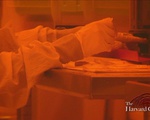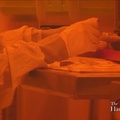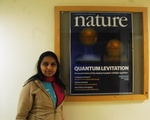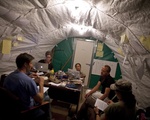Science
Altering Cancer Diagnosis
Researchers at Harvard Medical School have made a landmark discovery in cancer genomics that may permanently shift the way cancer is currently diagnosed.
A Golden Levitating Act
Hamsa Sridhar ’12 works with levitating gold on a regular basis—but the work is neither magical nor costly.
New Lab Device Improves Experiment Speed
A group including several Harvard researchers has developed a new microfluidic screening device that can run biochemical experiments on a much smaller, faster, and more cost-effective scale.
Sophomore conducts research levitating micro-particles.
Hamsa Sridhar ‘12 is conducting research at the School of Engineering and Applied Sciences that seeks to levitate gold-coated micro-particles. The research made the front cover of the journal Nature.
Device Monitors Micro Activity
Using an array of high-performance lenses integrated on a chip containing microfluids, researchers at the School of Engineering and Applied Sciences have developed a way to accurately detect microscopic activity.
Harvard Duo Builds Hospital in Haiti
Stephanie Rosborough ’96 and Hilarie Cranmer set up a rehabilitation center near Port-au-Prince in the wake of the earthquake to help Haitians in need.
Ethan A. Kruse: Turning His Eyes to the Sky
Ethan A. Kruse ’12 researchers the magnetic field measurements of approximately 50,000 stars and characterizes the evolution of these fields over time.
Common Drug May Revolutionize Treatment of Strokes and Heart Attacks
The recently discovered effects of a common over-the-counter drug may have important implications for the treatment and prevention of heart attacks and strokes, according to a study published Sunday in the journal Nature Biotechnology.
Roundworm Bacteria Research Shows Promise for Development of New Antibiotics
In a finding that bodes well for the development of new human antibiotics, Harvard researchers have determined the identity of the trigger that causes roundworm bacteria to excrete virulent substances.
Plant Species Invade Walden Pond
Climate change has converted Henry David Thoreau’s beloved Walden Pond into a battle site between native and non-native plant species, and it seems as though the non-natives—particularly invasives—are emerging victorious, according to a study published by Harvard researchers last month.
Changing the Culture
Harvard's new and innovative stem cell concentration focuses on the humanity behind the research to create classes that are anything but standard.
Study Explains Infant Death
Sudden Infant Death Syndrome, the leading cause of death among infants less than 12 months old in the U.S. may be linked to low levels of serotonin in brain tissue, according to researchers at Harvard-affiliated Children’s Hospital Boston.
Shopping Week, Day Four: Me Want Food!
Sometimes shopping six courses a day can lead to missed meals and hunger pangs during your umpteenth syllabus perusal of the day. In fact, some of you are probably hungry right now. Well, we’ve got just the solution for you! Get your daily serving via one of these food-related courses.
Chronic Sleep Loss Causes Slowed Reaction Time
Researchers at Harvard-affiliate Brigham and Women's Hospital find that chronic sleep loss over several weeks causes reaction time to slow almost tenfold, increasing the risk of fatigue-related accidents.












